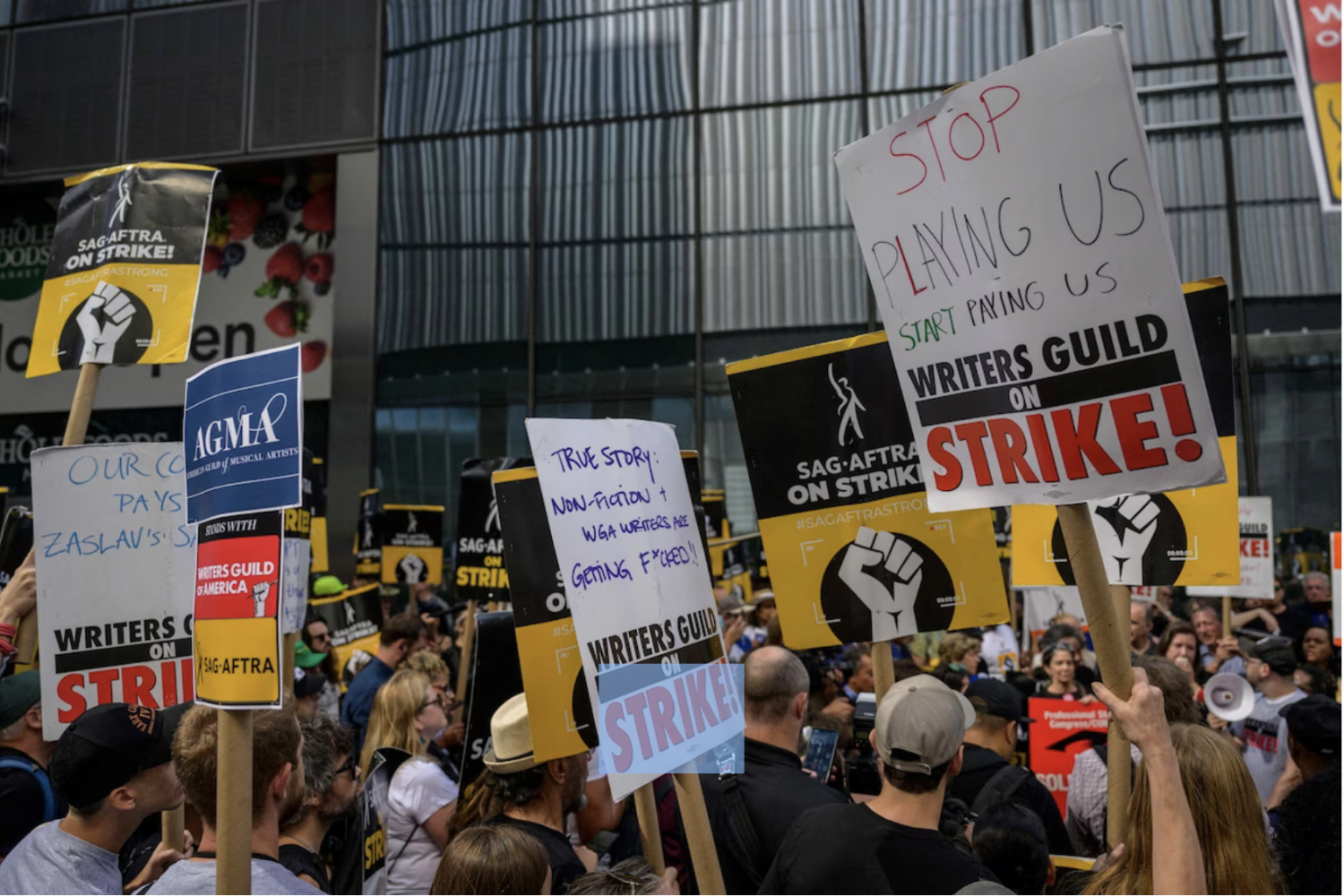This article is more than
1 year oldHollywood writers are still on strike. Here’s where WGA, studios stand.

LOS ANGELES — Hollywood’s writers have been on strike since May 2. What’s keeping them from making a deal with the studios?
In part, it’s because technology and the way people consume entertainment have changed dramatically since 2007, the last time the writers went on strike. At that time, a big issue was residual payments from DVD sales.
Here’s a look at some of the major issues now dividing the Writers Guild of America (WGA) and the Alliance of Motion Picture and Television Producers (AMPTP). And keep in mind, even if issues get resolved with the writers, the Screen Actors Guild-American Federation of Television and Radio Artists has been on strike for about 40 days and has to negotiate a separate deal with the studios.
Streaming
This issue has bedeviled the industry ever since Netflix released all 13 episodes of “House of Cards” at once in 2013, proving that streaming services could produce quality content and that viewers would pay to binge it. It contributed to profound changes in how Hollywood did business, perhaps most significantly how writers worked and how they got paid. Several streaming-related issues are now being litigated in the writers strike.
Theoretically, the more popular a show, the more leverage its writers would have to demand higher residuals, but studios and streaming services have been very opaque about viewership data. The AMPTP, which includes movie studios, TV networks and streaming services such as Amazon, Apple and Disney, proposes to share confidential quarterly reports with the WGA that would enable the guild to propose a new residual regime “in the future.” (Amazon founder Jeff Bezos owns The Washington Post. The Post’s interim CEO, Patty Stonesifer, sits on Amazon’s board.)
The WGA believes the viewership data should be available now and is proposing a viewership-based residual system to reward programs with greater viewership — on top of a guaranteed minimum residual.
Artificial intelligence
The WGA says progress has been made in negotiations. Writers feared that studios would start generating AI-produced scripts that would need only rewrites, eliminating the need for all but a few writers. But studios have agreed to a number of protections to ensure that AI-produced material is not passed off as the work of humans, and that writers are not shoved aside or faced with reduced payments as a result of AI.
However, writers also want to ensure that screenplays, scripts and other material they’ve written in the past will not be used to train AI systems. In other words, the screenwriters don’t want their work fed into the AI systems that synthesize vast reams of information from the internet, thus learning to appear more and more human in speech and writing.
Writers’ rooms
The process by which television shows are written is an overriding concern for many writers. Classic sitcoms such as “Seinfeld” or “Friends” employed as many as 12 writers under the showrunner in charge of the program’s overall operations. Writers would share ideas, and some would have the opportunity to go to the set of the show and interact with actors — thereby learning every step of the process. The writers were guaranteed employment for the better part of a year, and they usually earned enough to have at least a middle-class existence and to provide for a family.
Studios have already begun reducing the size of writers’ rooms to what are being called “mini-rooms,” with four or five people. In present negotiations, the AMPTP is proposing three-member writers’ rooms, including the showrunner. The WGA is demanding a minimum of six, with the ability to hire up to as many as six more, depending on the length of the series. Writers say shows suffer if fewer viewpoints are offered and a tiny group is forced to quickly turn around work. Additionally, minorities have said they believe they could be excluded if the sizes of writers’ rooms are decreased.
Length of employment
For all but the most well-known writers — and few writers really are well-known outside of Hollywood — being a screenwriter or TV writer means jumping from one project to another, pitching shows that never get made or movies that get produced but never released. It can be a tough way to make a living. The WGA is seeking a guarantee that writers on streaming shows would be employed for at least 13 weeks. The AMPTP’s counter is 10 weeks.
Keywords
Newer articles
<p>The ceremony was held in Moscow amid a tense geopolitical situation and diplomatic rift with the West</p>
West has a decision to make – Putin
Hamas tells Qatari, Egyptian mediators it agrees to ceasefire proposal
Fans stunned by TV star’s weight loss
Drake denies allegations by Kendrick Lamar of underage sex and harbouring secret child
Craig David, a hitmaker since 2000, is still getting audiences dancing
For Putin, Gaza is an endless gift
Bombshell new theory on Titan sub disaster
TikTok Ban Sparks Lawsuit Pitting National Security Concerns Against First Amendment Rights
‘It’s just not hitting like it used to’: TikTok was in its flop era before it got banned in the US
